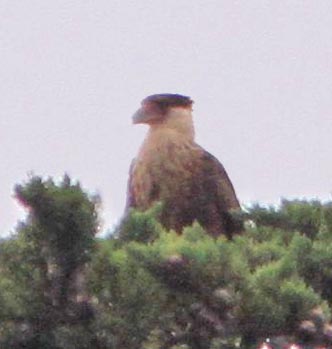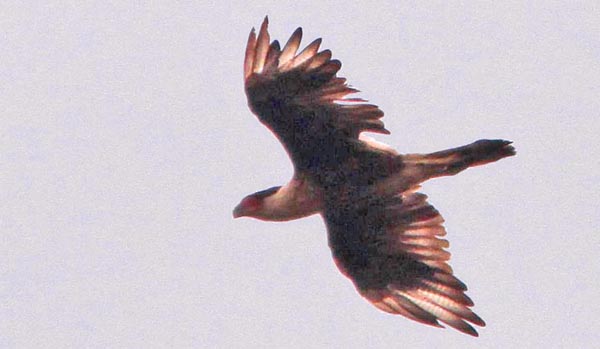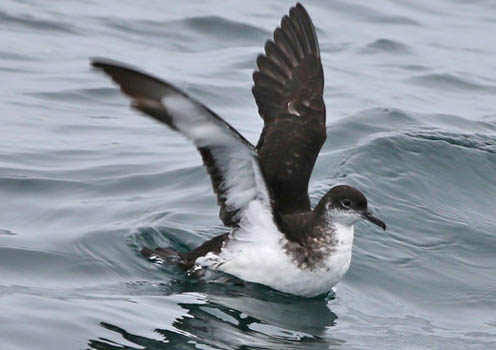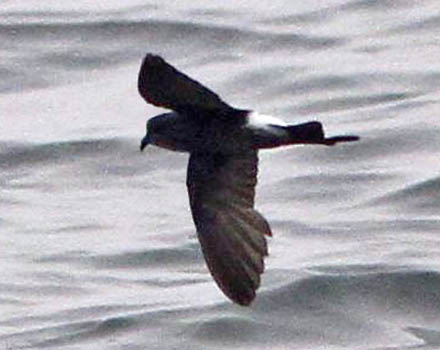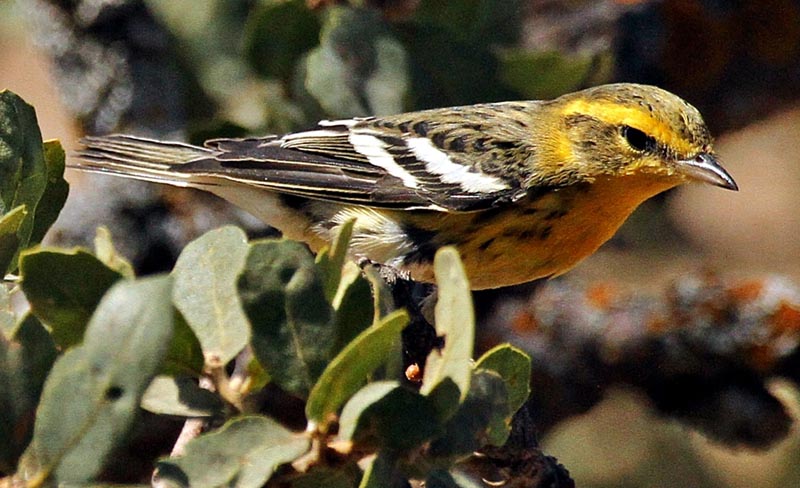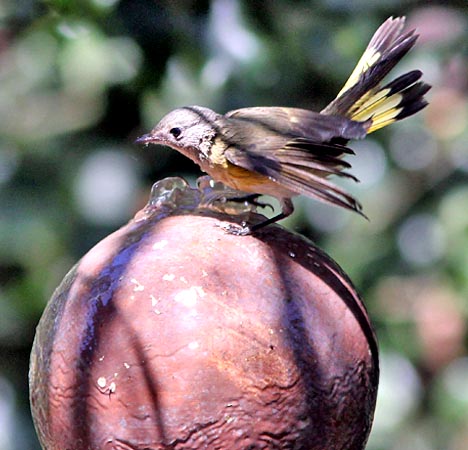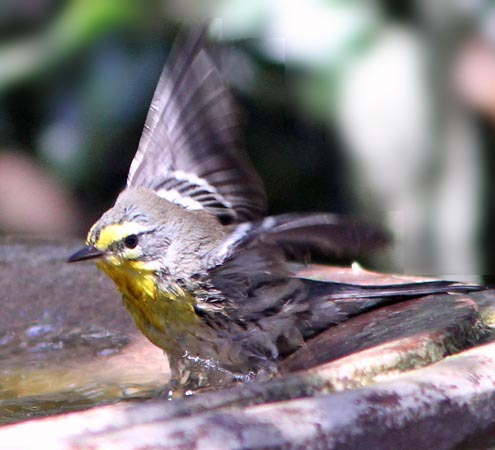| These highlights chronicle the year 2014. Created incrementally as new photos were available, the year runs generally "backwards" on this page. The abbreviation "MTY" means "Monterey County" in the text below. Text by Don Roberson. Photos on this page are copyrighted by the photographers to whom they are attributed, and may not be reproduced in any form (including other web sites) without the express consent of the photographer. | ||||||
|
||||||
|
||||||
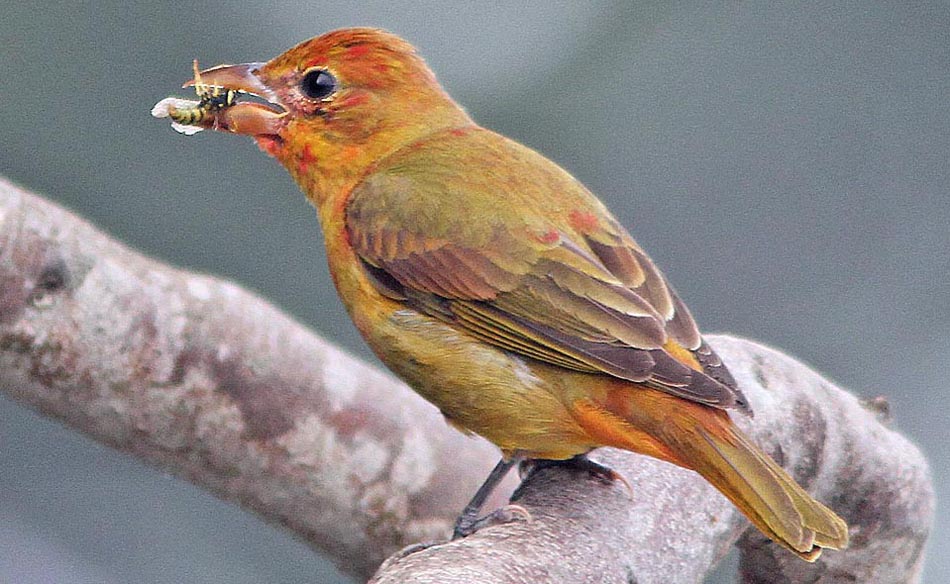 |
||||||
In very late October and early November, Red-throated Pipits and Lapland Longspurs were found in a plowed field near Zmudowski SB (Brian Sullivan, m.ob.). Chasing those birds on 29 Oct, Cooper Scollan and Don Glasco found an unusual plover standing it those same fields. It proved to be a Mountain Plover! There hasn't been a 'chaseable' one in MTY for years, so it was a crowd favorite through 1 Nov (date of this photo, right © Bill Hill). |
||||||
On 30 October, students at Cesar Chavez Elementary School in Salinas found a bird injured on school grounds (perhaps it hit a window or wire?). They brought it to the office, and SPCA was called. By the time volunteer Monika Kaufman arrived, the bird had died. But she and Jessica Shipman at SPCA recognized it was something very unusual! And indeed it was, a Yellow Rail (photo'd here with the Sibley field guide; ©SPCA). The only live one ever seen in MTY was back in Oct 1970, at Crespi Pond. |
||||||
|
||||||
| A year ago, in Sep-Oct 2013, MTY birders were enjoying an unprecedented invasion of Blue-footed Boobies — culminating with one sitting at Pt. Pinos on 8 Oct 2013. So far there has been no repeat incursion this autumn (although there are Blue-foots that reached the Farallon Is. again this year). Instead, there were four observations of Brown Booby in MTY coastal waters in Sep-Oct 2014. First, a young bird was found sitting on a floating log about 3 nmi west of Cypress Pt. on 6 Sep (B.L. Sullivan; photo above left © Cooper Scollan). Next, a subadult in flight off the Big Sur R. mouth was seen from the Andrew Molera SP headlands on 14 Sep (D. Roberson) during a huge feeding frenzy of Humpback whales, cormorants, gulls, terns, and shearwaters just off the river mouth. Third, one flew by a Shearwater Journeys boat perhaps 6 nmi west of Cypress Pt. on 13 Sep (Scott Terrill et al.). Finally, one was seen during a pelagic trip about 3 nmi SW of Cypress Pt. on 11 Oct (D. Roberson; photo above right © Michael Park). This adult was flying south and Michael Park's photo is extraordinary because it was taken at perhaps a quarter-mile distance! There have been quite a movement of Brown Boobies this summer and fall on the Farallones and along the San Mateo offshore regions. | ||||||
Meanwhile, as you will have read, warm waters in Monterey Bay attracted thousands of Black-vented Shearwater by July, and southern species like Brown Pelican, Heermann's Gull, and Elegant Tern were abundant. This changed dramatically after the first week of October. Many of these 'warm-water' birds headed south, passing observers a sea-watching spots, and by the second week of October their numbers were well down. Replacing them were a big influx of 'northern alcids,' including numbers of Rhinoceros Auklet and a few Tufted Puffin (right, photo 11 Oct © D. Roberson). Most dramatic was an influx of hundreds, maybe thousands, of Cassin's Auklet (below). I've been trying to get a decent photo of Cassin's for 40 years, and finally, with this incursion, managed a satisfactory flight shot from a boat not far off Pt. Pinos (below on 11 Oct © D. Roberson). |
||||||
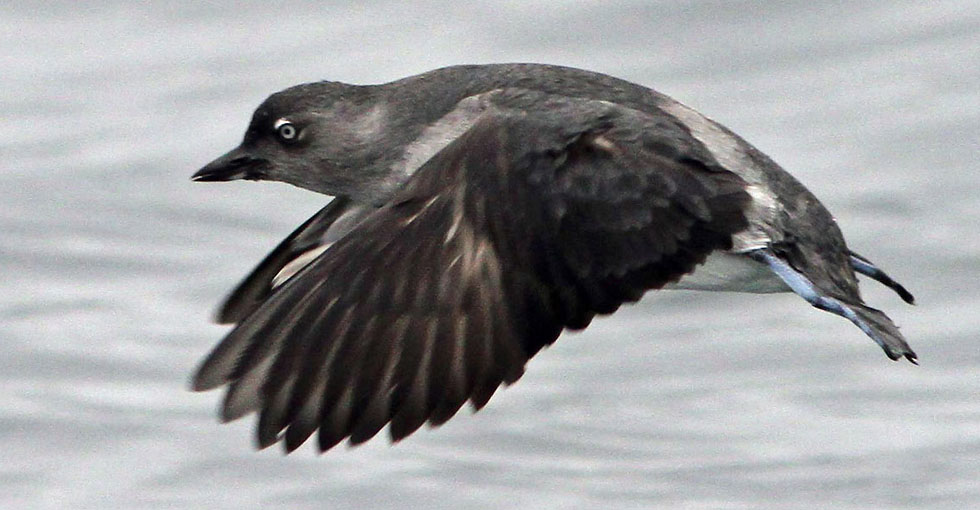 |
||||||
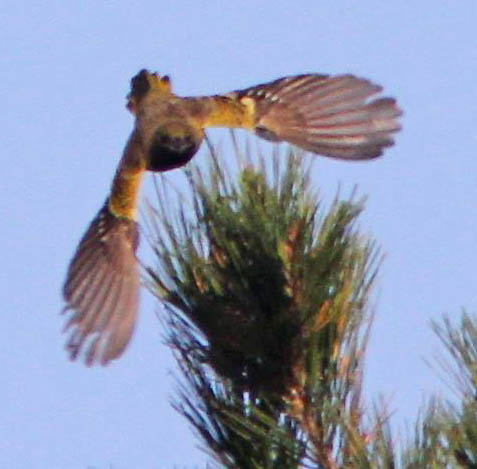
In what is becoming known as the season of the "Treasures of the Sierra Madre," birders "don't need no stinkin' badges" to look for vagrants from the Southwest. There have been a couple of Virginia's Warblers, nearby counties have had Yellow-green Vireo, and in mid-September an amazing Grace's Warbler took a mid-day bath in a private backyard (see below). Now, in the first week of October, a Scott's Oriole (left and below, © D. Roberson) appeared in a private backyard on the western slopes of Jacks Peak on 3 Oct (Blake Matheson). The primary resident permitted a few local observers to try for it on the morning of 4 Oct, where their prayers were answered with this southwestern treasure. There has not been a 'chaseable' Scott's Oriole in MTY since a young male frequented Jack Blee's feeder on Jacks Peak 14 Feb-27 Mar 1966, some 48 years ago! The only other county records are a specimen from Hastings NHR (26 Nov 1955) and an unconfirmed sight report from Asilomar of a male on 30 Mar 1995. This year's bird was singing. Based on the plumage and the status of molt shown in these photos, Peter Pyle aged this bird as a HY ('hatch-year') male. [I had mistaken a disarranged primary for molt, and my earlier suggestion of SY male was mistaken.] |
||||||
|
||||||
SCENES FROM A CEMETERY [below] |
||||||
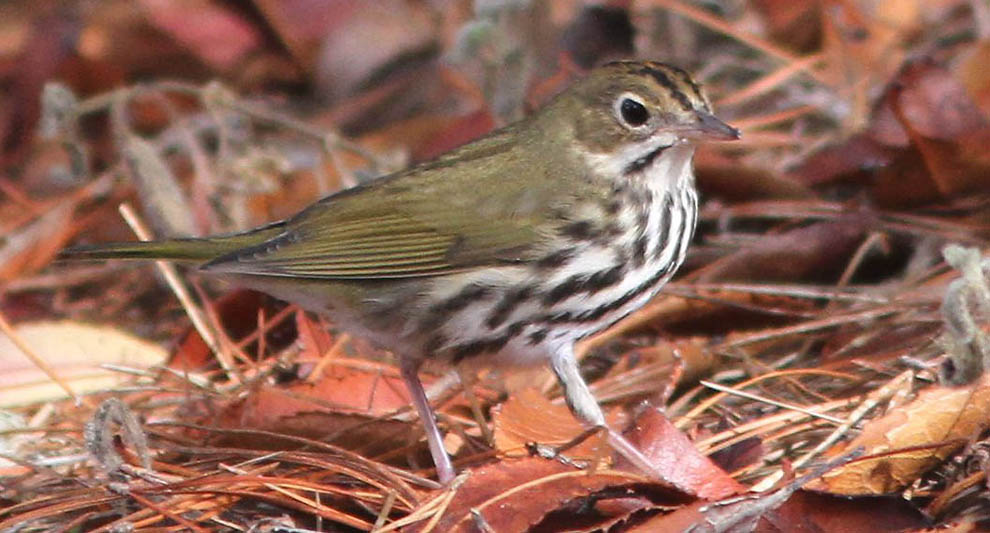 |
||||||
As strange as it may seem, the 'happening spot' in late September & early October was the El Carmelo Cemetery in Pacific Grove. Certainly the star of the show was this Ovenbird (above) on 28 Sep. Found by Larry Rose mid-day in the "thicket" — a patch of native trees/shrubs that was once the center of political outrage in P.G. when the City threatened to cut it down for more gravesites — this engaging performer limited its engagement to a single afternoon. |
||||||
 |
||||||
But
the cemetery itself was hopping with a dramatic assortment of vagrant
warblers from 21-30 September — some highlights in gallery below: |
||||||
|
||||||
 |
||||||
We
presume that most of the vagrants were HY ('hatch-year') individuals
except for adults as noted. Key to cemetery gallery above: In addition, another Northern Parula, presumably a HY bird, was present 22-30 Sep (some saw both Parulas together), a Tennessee Warbler was present 22-24 Sep, and a HY male Chestnut-sided Warbler 21-22 Sep, plus a presumed HY female Chestnut-sided Warbler 2-3 Oct. The Ovenbird was the best of all the vagrants. Although there were 22 prior records, about equally split between spring and fall migrations, two-thirds of those had hit windows, got caught in a net, or been killed by a cat. There had not been a 'chaseable' multi-day Ovenbird since Oct 1968 (45 years ago!) and this one, like almost all the others, was a "one day wonder." |
||||||
El Carmelo Cemetery was not the only location with vagrant warblers. On 30 Sep additional rare warblers — another Virginia's, two more Blackpolls, two more Am. Redstarts — were found elsewhere in Pacific Grove from Esplanade Park to Jewel Park. At Laguna Grande Park in Seaside there was an obliging Blackpoll Warbler on 3 Oct (right |
||||||
|
||||||
|
||||||
Depending on where the vultures were, the Crested Caracara was sometimes present on or over Andrew Molera SP, occasionally allowing closer approach (photos 27 Sep © Don Roberson). The combination of mostly streaked breast, patchy black belly, and heavy wing molt suggest this individual may be in its second year. |
||||||
|
||||||
And meanwhile, out on Monterey Bay, among the thousands of warm-water Black-vented Shearwaters, surprising numbers of Manx Shearwater
were seen in September. Most boat trips for birders had 1-3 birds;
sea-watchers from Pt. Pinos who spent enough time sometimes had up to
6/day. This photo (below left) was a couple miles offshore on 5 Sep
(below left © Gil Ewing). On 13 Sep, a couple of Wilson's Storm-Petrel from 4-6 mi west of Pt. Pinos were very surprising (below right © D. Roberson). |
||||||
|
||||||
An excellent find on 12 Sep in the far southeastern corner of MTY was this HY male Blackburnian Warbler along Turkey Flat Rd. (ph © Will Lawton). |
||||||
The first of the southwestern "Treasures of the Sierra Madre" this fall was a Grace's Warbler
in a backyard birdbath of 5 Sep in Pacific Grove (all photos below
© D. Roberson). This was only the second MTY record; the first was
one that wintered in a pine forest atop Jacks Peak 12 Dec 1998-14 Feb
1999. This 2014 bird took a long bath and did not return to the
backyard, but some observers were able to locate it in an adjacent yard
later that afternoon. Ironically, during its bath in the basin (lower
right), an American Redstart (below left) was bathing simultaneously in the 'bubbler' at the top of the fountain! |
||||||
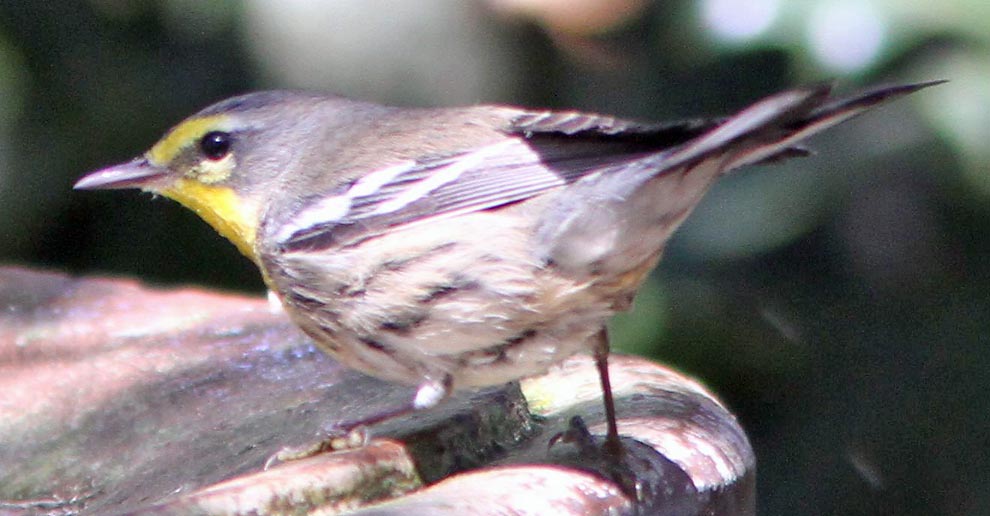 |
||||||
|
||||||
There
were other rarities in MTY in Sep 2014, but some were not documented
with photos and others (e.g., Tropical Kingbird) are now regular each
fall. This summary is not meant to be a complete wrap-up of any month;
rather, it is an overview with available photos. Thanks. |
||||||
|
|
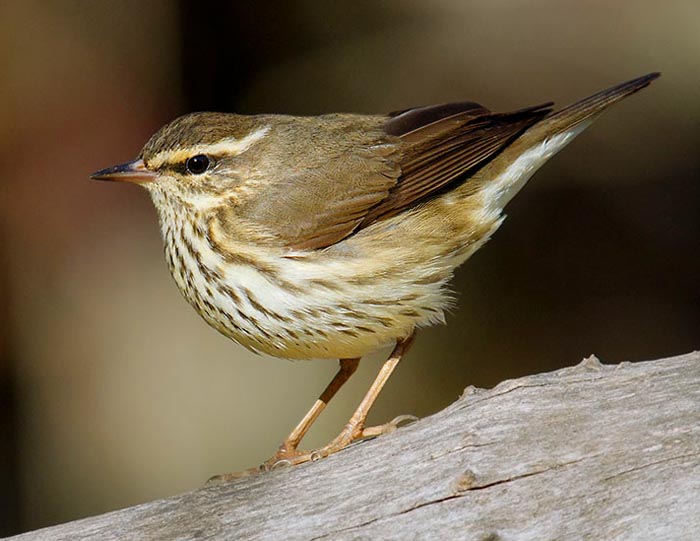
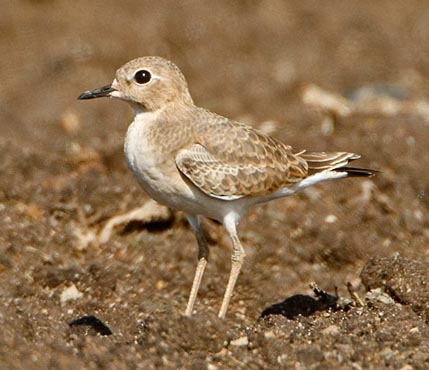
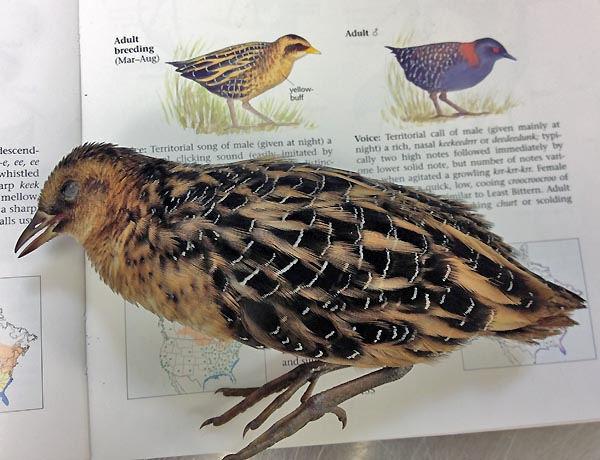
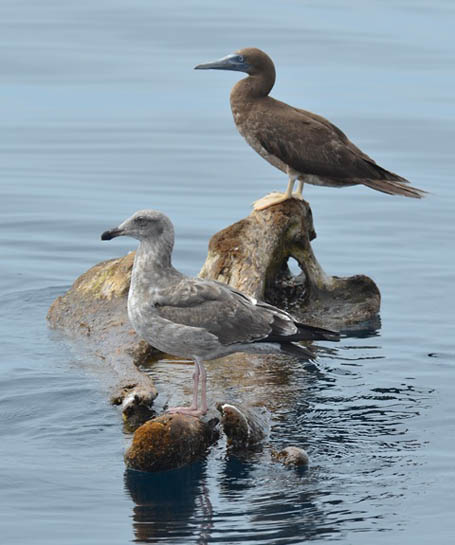
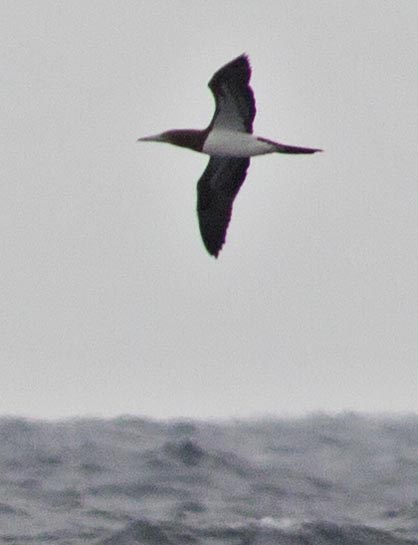
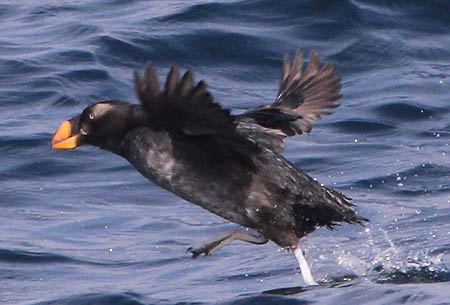
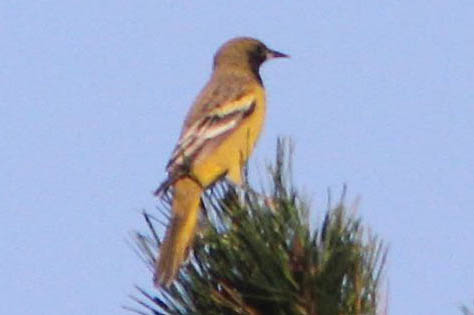
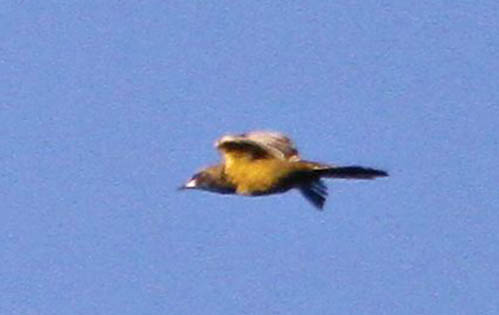
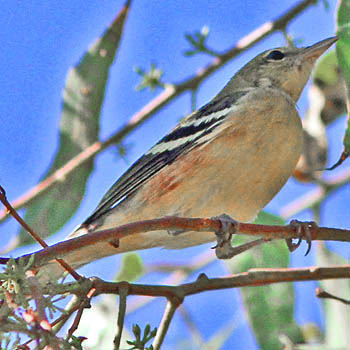

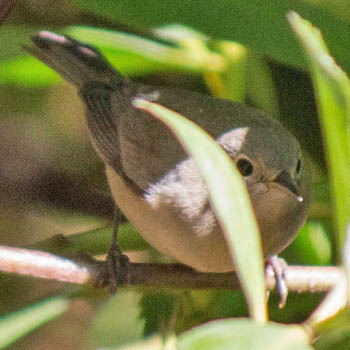
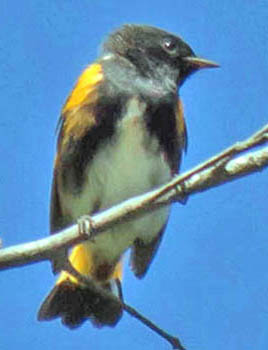
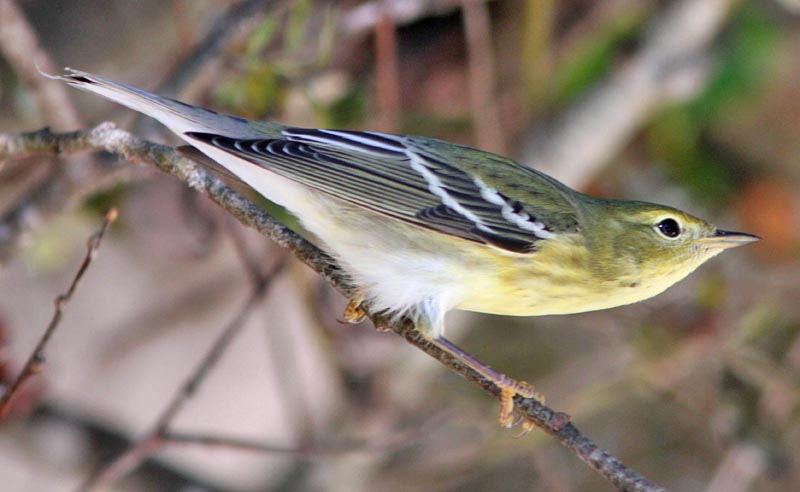
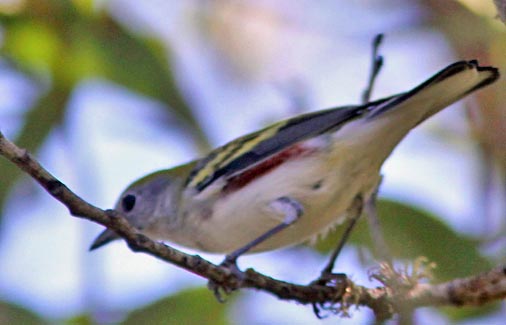
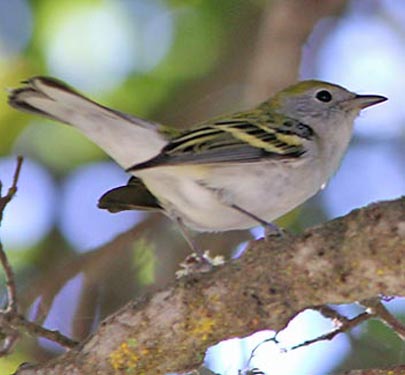
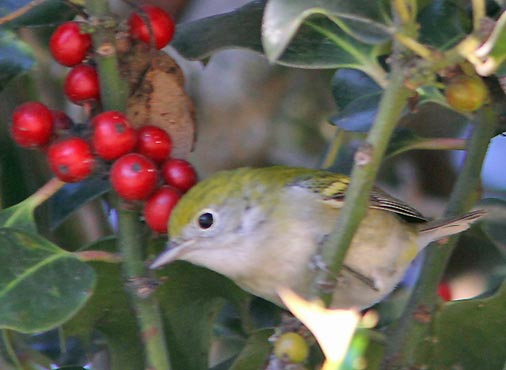
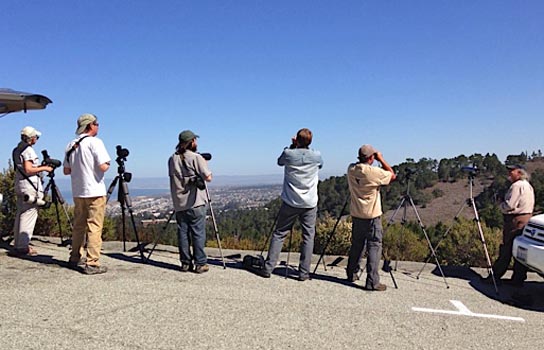 Meanwhile,
Brian Sullivan started a new trend by conducting focused 'hawk-watches'
on an overlook at the top of Jacks Peak Road. On 26 Sep he observed a
juv Broad-winged Hawk among a good selection of
hawks. He was joined on 1 & 2 Oct by others (ph left from 2 Oct;
Brian is the only one without a cap; © Rita Carratello). Every
hawkwatch had a selection of accipiters (e.g., Cooper's Hawk,
below, 1 Oct © D. Roberson); other raptors included Osprey, Golden
Eagle, N. Harrier, Ferruginous Hawk and Merlin. On 2 Oct, all present
saw a Broad-winged Hawk.
Meanwhile,
Brian Sullivan started a new trend by conducting focused 'hawk-watches'
on an overlook at the top of Jacks Peak Road. On 26 Sep he observed a
juv Broad-winged Hawk among a good selection of
hawks. He was joined on 1 & 2 Oct by others (ph left from 2 Oct;
Brian is the only one without a cap; © Rita Carratello). Every
hawkwatch had a selection of accipiters (e.g., Cooper's Hawk,
below, 1 Oct © D. Roberson); other raptors included Osprey, Golden
Eagle, N. Harrier, Ferruginous Hawk and Merlin. On 2 Oct, all present
saw a Broad-winged Hawk. 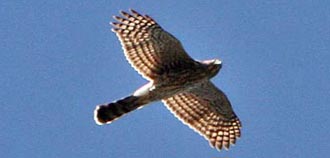
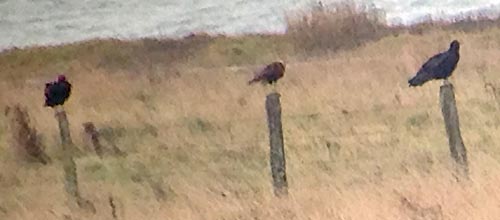 Down the Big Sur coast, a sub-adult Crested Caracara
was found with vultures on fenceposts on the private El Sur Ranch.
Scopes were usually necessary to locate this bird (i.e., the middle
bird in this digiscoped shot, right). After single day observations of
a Caracara near Greenfield in Aug and at Elkhorn Slough in early Sep,
this individual was found here 20 Sep (Cooper Scollan). It was still
present into early Oct.
Down the Big Sur coast, a sub-adult Crested Caracara
was found with vultures on fenceposts on the private El Sur Ranch.
Scopes were usually necessary to locate this bird (i.e., the middle
bird in this digiscoped shot, right). After single day observations of
a Caracara near Greenfield in Aug and at Elkhorn Slough in early Sep,
this individual was found here 20 Sep (Cooper Scollan). It was still
present into early Oct.